[ 034 ]
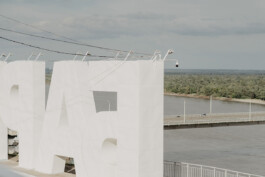
1
Erie Ehrenberg (DE),
Heimat
Barnaul, Russia
When I am traveling I often encounter the question where I am from – and every time, I struggle to answer. In my case, there isn’t such a place. I start to explain that I live in Germany but I was born in Russia. «So you are Russian then?» is a common follow-up question—and my answer is «Jein» [German for a mix of yes and no]. I am one of these individuals politics call legal immigrants or in my case more specific Spätaussiedler [∼ repatriates]. Aussiedler are a group of people that are considered as of German ethnic origin who lived in former German territories or were colonists in the Russian Empire who arrived over 300 years ago. At that time huge parts of the Russian Empire had been uncharted. In 1762, empress Catherine the Great (herself being German nobility) invited foreigners from Europe to settle on Russian territory and to cultivate the soil with promises of free land and privileges. The so-called Russlanddeutsche [German-Russians] gathered in German communities living their culture, language and traditions. Despite living through hardships and political changes the colonists managed to become a stable part of the Russian society.
Facing the German question in the end of the 19th century the political elite was fearing the German population becoming to influential as they were economically successful and attempted to russificate them. With the World Wars the circumstances became worse: During 1914 until 1918 the German conscripts were sent to the front to avoid collaborations and spying, whilst during World War Two whole families were deported to western Siberia or northern Kazakhstan and forced to work in labour camps, similar to the ones in Nazi-Germany. Through the blossoming of the USSR the russification prevailed following the communist ideal. Mixed marriages became common. Nevertheless the Germans became less and less visible as a segregated ethnic group, the wish to emigrate to splitted Germany persisted. The borders of the Soviet union kept closed (bpb 2005). Since the 1950’s around 4,5 million people who could proof their German origin were allowed to ‘repatriate’ from countries in eastern Europe like Poland and Romania as a result of the Federal Expellee Law (1953). Political reforms of general secretary Michail Gorbatschow in 1989 kicked off the migration wave from former communist entities as Russia and Kazakhstan. This is how my family and I came to Germany in 1997.
«A man's homeland is wherever he prospers.»
Aristophanes
Reminiscence
My first childhood memories are of Germany. The only memories prior to that are on numerous VHS cassettes. After moving abroad, or as I prefer to say after I have been moved, I quickly caught up. Within six months I was quite fluent in German and I even remember moments in my childhood resisting to speak Russian, saying it’s a stupid language and not understanding why people speak it at all. During primary school I was trying to hide my family’s origin - which wasn’t hard thanks to my German sounding name, the blonde hair and the blue eyes. Living in eastern Germany, Chemnitz, even reinforced that behaviour as not feeling welcomed. Fearing racist assaults (that happened now and then) my mother forbid me to speak Russian on the playground or in the city centre. Although I tried, I wasn’t really German. Russia kept on living in my parents - both being raised with communist mindset by Russian mothers -, in the language we spoke among each other and the education they gave me. Everything I know about Germany I picked up in school, through friendships and the media. I understand this country, know how to act appropriately, speak German most fluently from all languages I learned but still, there are situations, especially when being around with German Germans, I don’t get the context, not knowing a lot of sayings, dialects, customs or music that are so natural to them… At the beginning of my teenage years I was sent to play theatre in Russian. As an adolescent, looking for some orientation and identity, I was quickly embedded into a community with Russian speaking friends having similar backgrounds as myself reinforcing me to explore and show my Russian side. I became an appreciator of Russian literature and poetry, started seeing and enjoying the cultural differences and similarities, had some memorable trips to St. Petersburg and realised that languages separate and connect people at the same time. My first ‘I love you’ although was in German.
Heimat
I always felt torn between these two worlds - not fully being one or the other. It had this bitter taste of not being complete because I always experienced it as I had to choose and commit to one. This caused a deep internal conflict in me. I started to ponder about the concept of having a homeland at all that led me to the question whether I really need to have a “Heimat” to feel like a complete person? “Heimat” (∼ homeland) is a German word that looses its specific sense when translating it into another language as it has particular connotations to the German culture, as the German Romanticism or German nationalism. Quite close is the Russian word “родина” (spoken: rodina) pointing to the place you were born, a geographical spot on this globe. There is no single or general definition although it is a well-observed and discussed topic. One of these observations is that Heimat describes the relation between a human being and space. Furthermore that having a homeland gives you a sense of psychological stability and trust as it is an environment that is understandable, predictable and provides a framework for action. Moreover checking the German dictionary Duden Heimat is a singular. This singularity and exclusivity of one place facing fluid borders, enhanced mobility, globalized culture and individuals like me, makes this concept appear outdated. How can we live by an idea that hasn’t changed a lot since the beginning of the 20th century when nationalism was en vogue, an approach not reflecting current realities?
Returning
I haven’t been to my birthplace for 15 years and the last visit just left some vague memories. When my mother proposed to visit my family this August I couldn’t wait to take that trip. To me it felt like a travel back in time where I had the opportunity to dig deep into the environment my parents grew up in. It was a time of self-discovery, getting to know my ‘roots’ in order to better understand myself. None of us ever regretted moving to Germany but sometimes I still wonder how it would have been and who would I be right now if my parents had decided to stay. Cities are shaped by the people but cities also shape people. What kind of trace has my birthplace left in me? Is it a piece of my Heimat? Barnaul is in the Asian part of Russia, located more than 3.000 km east from its capital Moscow and 5.000 more until the eastern border. Akinfey Demidov, a Russian nobleman and mine-owner started copper extraction and melting in the region and is considered as the founding father of the city that was established around 1730. Later on the focus switched to gold and silver sourcing and making Barnaul the centre of silver production of the entire Russian Empire. If you haven’t been to Russia before, it’s hard to imagine how a city like this looks like. And when you have been to St. Petersburg or Moscow you haven’t seen Russian Russia. Barnaul has been an industrial city ever since. These kind of cities (that Russia has a lot of) are not built for aesthetic, they are constructed by the principle “form follows function”. Russian cities are huge, connected by broad soviet streets making you feel like an ant. The buildings are a wild mix of private (mostly wooden) houses, cubistic soviet plattenbau from different decades, shapeless contemporary skyscrapers and some historic edifices sprinkled in between. The air is heavy, the winters very cold and the summers dry.
«But I believe above all that I wanted to build the palace of my memory, because my memory is my only homeland.»
Anselm Kiefer
Arriving at the place where my life’s journey started it didn’t took me long to understand that I am total stranger to this place. Only my family, the stories that they told, kept this connection alive and the stamp in my passport saying ‘birthplace: Barnaul’. Getting to know the city from a local’s point of view, spending time with my relatives, visiting my grandfather’s grave and even getting to know the village in the middle of nowhere where my mum spent her childhood summers with my great-grandmother, deepened the connection to them and the city. Yet, these places are a part of their stories not mine. What makes a place a home are the memories connected to it, the people that make us feel welcomed and where we can prosper. It is like developing a relationship, it takes time and effort. This city is just becoming a vivid part of my memory as I start to engage with it. Everywhere can become a home(land) as long as you are willing to build this connection. And still, you can live somewhere for ages but never feel at home. As being human also means being a social entity, it is also about the people, that give you that sense of ‘feeling at home’. Speaking with Goethe, the most famous of German poets: Alle diese vortrefflichen Menschen, zu denen Sie nun ein angenehmes Verhältnis haben, das ist es, was ich eine Heimat nenne [All the excellent people you have a pleasant relationship with, that is what I call homeland].
I will always feel a deep connection to Russia, its melancholy, romantic composers and watching movies in Russian, but also appreciate the German accuracy and the sense of responsibility. Equally I love French style, Japanese food and the Viennese lifestyle… So why do I have to choose when all of these things give me that sense of Heimat? I choose to let go of the pressure of this social expectation and make this world my Heimat, that is a singular but consisting of multiple places - so a plural. To remember the past is necessary for a better understanding of the now, but what is even more important is thinking about where we are heading towards. As we currently live in a globalizing world we should strive to consider ourselves as world citizens and build our identity more around the fact that we are a community of human beings not nations/nationalities, desperately fighting for the preservation of the past and imagined borders. When someone asks me now who I am, I answer: “A human being in the first place, the rest is history”.
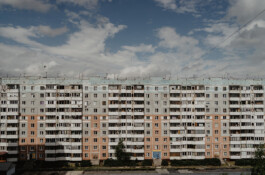
2
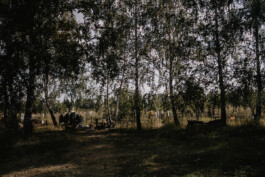
3
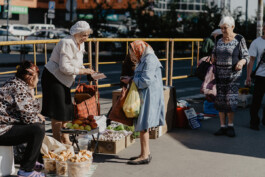
4
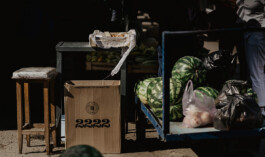
5
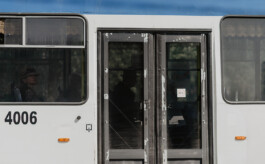
6
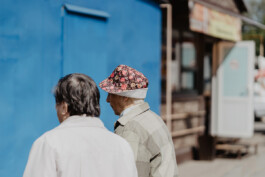
7
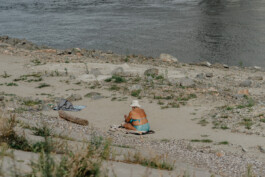
8
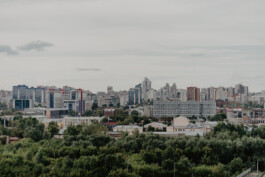
9
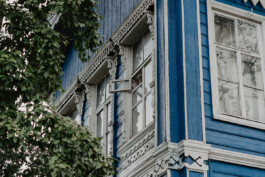
10
Images
1–10 Erie Ehrenberg, Barnaul, Russia 2018.
Text

1
Erie Ehrenberg (DE),
Heimat
Barnaul, Russia
When I am traveling I often encounter the question where I am from – and every time, I struggle to answer. In my case, there isn’t such a place. I start to explain that I live in Germany but I was born in Russia. «So you are Russian then?» is a common follow-up question—and my answer is «Jein» [German for a mix of yes and no]. I am one of these individuals politics call legal immigrants or in my case more specific Spätaussiedler [∼ repatriates]. Aussiedler are a group of people that are considered as of German ethnic origin who lived in former German territories or were colonists in the Russian Empire who arrived over 300 years ago. At that time huge parts of the Russian Empire had been uncharted. In 1762, empress Catherine the Great (herself being German nobility) invited foreigners from Europe to settle on Russian territory and to cultivate the soil with promises of free land and privileges. The so-called Russlanddeutsche [German-Russians] gathered in German communities living their culture, language and traditions. Despite living through hardships and political changes the colonists managed to become a stable part of the Russian society.
Facing the German question in the end of the 19th century the political elite was fearing the German population becoming to influential as they were economically successful and attempted to russificate them. With the World Wars the circumstances became worse: During 1914 until 1918 the German conscripts were sent to the front to avoid collaborations and spying, whilst during World War Two whole families were deported to western Siberia or northern Kazakhstan and forced to work in labour camps, similar to the ones in Nazi-Germany. Through the blossoming of the USSR the russification prevailed following the communist ideal. Mixed marriages became common. Nevertheless the Germans became less and less visible as a segregated ethnic group, the wish to emigrate to splitted Germany persisted. The borders of the Soviet union kept closed (bpb 2005). Since the 1950’s around 4,5 million people who could proof their German origin were allowed to ‘repatriate’ from countries in eastern Europe like Poland and Romania as a result of the Federal Expellee Law (1953). Political reforms of general secretary Michail Gorbatschow in 1989 kicked off the migration wave from former communist entities as Russia and Kazakhstan. This is how my family and I came to Germany in 1997.
«A man's homeland is wherever he prospers.»
Aristophanes
Reminiscence
My first childhood memories are of Germany. The only memories prior to that are on numerous VHS cassettes. After moving abroad, or as I prefer to say after I have been moved, I quickly caught up. Within six months I was quite fluent in German and I even remember moments in my childhood resisting to speak Russian, saying it’s a stupid language and not understanding why people speak it at all. During primary school I was trying to hide my family’s origin - which wasn’t hard thanks to my German sounding name, the blonde hair and the blue eyes. Living in eastern Germany, Chemnitz, even reinforced that behaviour as not feeling welcomed. Fearing racist assaults (that happened now and then) my mother forbid me to speak Russian on the playground or in the city centre. Although I tried, I wasn’t really German. Russia kept on living in my parents - both being raised with communist mindset by Russian mothers -, in the language we spoke among each other and the education they gave me. Everything I know about Germany I picked up in school, through friendships and the media. I understand this country, know how to act appropriately, speak German most fluently from all languages I learned but still, there are situations, especially when being around with German Germans, I don’t get the context, not knowing a lot of sayings, dialects, customs or music that are so natural to them… At the beginning of my teenage years I was sent to play theatre in Russian. As an adolescent, looking for some orientation and identity, I was quickly embedded into a community with Russian speaking friends having similar backgrounds as myself reinforcing me to explore and show my Russian side. I became an appreciator of Russian literature and poetry, started seeing and enjoying the cultural differences and similarities, had some memorable trips to St. Petersburg and realised that languages separate and connect people at the same time. My first ‘I love you’ although was in German.
Heimat
I always felt torn between these two worlds - not fully being one or the other. It had this bitter taste of not being complete because I always experienced it as I had to choose and commit to one. This caused a deep internal conflict in me. I started to ponder about the concept of having a homeland at all that led me to the question whether I really need to have a “Heimat” to feel like a complete person? “Heimat” (∼ homeland) is a German word that looses its specific sense when translating it into another language as it has particular connotations to the German culture, as the German Romanticism or German nationalism. Quite close is the Russian word “родина” (spoken: rodina) pointing to the place you were born, a geographical spot on this globe. There is no single or general definition although it is a well-observed and discussed topic. One of these observations is that Heimat describes the relation between a human being and space. Furthermore that having a homeland gives you a sense of psychological stability and trust as it is an environment that is understandable, predictable and provides a framework for action. Moreover checking the German dictionary Duden Heimat is a singular. This singularity and exclusivity of one place facing fluid borders, enhanced mobility, globalized culture and individuals like me, makes this concept appear outdated. How can we live by an idea that hasn’t changed a lot since the beginning of the 20th century when nationalism was en vogue, an approach not reflecting current realities?
Returning
I haven’t been to my birthplace for 15 years and the last visit just left some vague memories. When my mother proposed to visit my family this August I couldn’t wait to take that trip. To me it felt like a travel back in time where I had the opportunity to dig deep into the environment my parents grew up in. It was a time of self-discovery, getting to know my ‘roots’ in order to better understand myself. None of us ever regretted moving to Germany but sometimes I still wonder how it would have been and who would I be right now if my parents had decided to stay. Cities are shaped by the people but cities also shape people. What kind of trace has my birthplace left in me? Is it a piece of my Heimat? Barnaul is in the Asian part of Russia, located more than 3.000 km east from its capital Moscow and 5.000 more until the eastern border. Akinfey Demidov, a Russian nobleman and mine-owner started copper extraction and melting in the region and is considered as the founding father of the city that was established around 1730. Later on the focus switched to gold and silver sourcing and making Barnaul the centre of silver production of the entire Russian Empire. If you haven’t been to Russia before, it’s hard to imagine how a city like this looks like. And when you have been to St. Petersburg or Moscow you haven’t seen Russian Russia. Barnaul has been an industrial city ever since. These kind of cities (that Russia has a lot of) are not built for aesthetic, they are constructed by the principle “form follows function”. Russian cities are huge, connected by broad soviet streets making you feel like an ant. The buildings are a wild mix of private (mostly wooden) houses, cubistic soviet plattenbau from different decades, shapeless contemporary skyscrapers and some historic edifices sprinkled in between. The air is heavy, the winters very cold and the summers dry.
«But I believe above all that I wanted to build the palace of my memory, because my memory is my only homeland.»
Anselm Kiefer
Arriving at the place where my life’s journey started it didn’t took me long to understand that I am total stranger to this place. Only my family, the stories that they told, kept this connection alive and the stamp in my passport saying ‘birthplace: Barnaul’. Getting to know the city from a local’s point of view, spending time with my relatives, visiting my grandfather’s grave and even getting to know the village in the middle of nowhere where my mum spent her childhood summers with my great-grandmother, deepened the connection to them and the city. Yet, these places are a part of their stories not mine. What makes a place a home are the memories connected to it, the people that make us feel welcomed and where we can prosper. It is like developing a relationship, it takes time and effort. This city is just becoming a vivid part of my memory as I start to engage with it. Everywhere can become a home(land) as long as you are willing to build this connection. And still, you can live somewhere for ages but never feel at home. As being human also means being a social entity, it is also about the people, that give you that sense of ‘feeling at home’. Speaking with Goethe, the most famous of German poets: Alle diese vortrefflichen Menschen, zu denen Sie nun ein angenehmes Verhältnis haben, das ist es, was ich eine Heimat nenne [All the excellent people you have a pleasant relationship with, that is what I call homeland].
I will always feel a deep connection to Russia, its melancholy, romantic composers and watching movies in Russian, but also appreciate the German accuracy and the sense of responsibility. Equally I love French style, Japanese food and the Viennese lifestyle… So why do I have to choose when all of these things give me that sense of Heimat? I choose to let go of the pressure of this social expectation and make this world my Heimat, that is a singular but consisting of multiple places - so a plural. To remember the past is necessary for a better understanding of the now, but what is even more important is thinking about where we are heading towards. As we currently live in a globalizing world we should strive to consider ourselves as world citizens and build our identity more around the fact that we are a community of human beings not nations/nationalities, desperately fighting for the preservation of the past and imagined borders. When someone asks me now who I am, I answer: “A human being in the first place, the rest is history”.

2

3

4

5

6

7

8

9

10
Images
1–10 Erie Ehrenberg, Barnaul, Russia 2018.